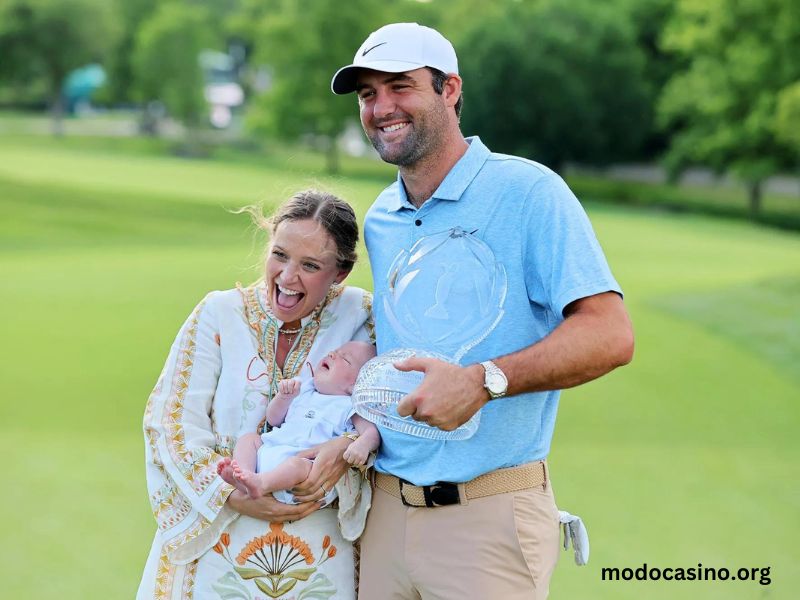When it comes to professional sports, particularly golf, players often garner attention for their skills, achievements, and sometimes even their quirks. Scottie Scheffler, the rising star on the PGA Tour, is no exception. Beyond his impressive performances and victories, he has also captured the hearts of fans with a playful nickname: “Baby Ears.” This article explores the origins of this endearing moniker, its impact on Scheffler’s persona, and the larger conversation about nicknames in sports.
The Origins of “Baby Ears”
Scottie Scheffler, born on June 21, 1996, in Ridgewood, New Jersey, has always been a figure of interest in the golf community. His rise through the ranks—from junior golf to college competitions and eventually to the PGA Tour—has been marked by impressive talent and a work ethic that many admire. However, his nickname, “Baby Ears,” stems from a lighter aspect of his personality and appearance.
The nickname emerged from observations made by fans and commentators regarding the shape and size of his ears. While some might consider this a harmless tease, it quickly became an affectionate term that reflected Scheffler’s youthful demeanor and the relatable nature of his character. In an era where athletes often project a polished, almost unreachable image, “Baby Ears” provides a glimpse into Scheffler’s down-to-earth personality.
The Significance of Nicknames in Sports
Nicknames in sports serve multiple purposes. They can enhance a player’s brand, create a sense of camaraderie among teammates, or even provide levity in high-pressure situations. In Scheffler’s case, “Baby Ears” captures a balance of humor and humility.
- Creating Identity: Nicknames often help players define themselves in the eyes of fans and the media. For Scheffler, “Baby Ears” distinguishes him from other players. Instead of merely being another professional golfer, he becomes a figure with a relatable, approachable quality.
- Building Camaraderie: Within a team or group setting, nicknames can strengthen bonds. In a sport like golf, which is often seen as individualistic, having a nickname that resonates with teammates can enhance a player’s experience on tour. It fosters a sense of belonging and connection, making the intense pressures of the sport feel a little lighter.
- Engaging Fans: A nickname like “Baby Ears” can be a conversation starter among fans and analysts alike. It adds a layer of personality that fans can rally behind, allowing them to feel a connection to the player that goes beyond statistics and performance.
How Scheffler Embraces the Nickname
Scottie Scheffler has approached the nickname with good humor and grace. Rather than shying away from it, he has embraced it, demonstrating his willingness to not take himself too seriously. This attitude resonates well with fans and contributes to his growing popularity in the golfing world.
In interviews, Scheffler has often spoken about the importance of staying grounded and maintaining perspective, especially in a sport that can be highly stressful and competitive. Embracing the nickname “Baby Ears” showcases his ability to remain relatable, reminding fans that even elite athletes are human and can have fun with their image.
The Impact of Social Media
In today’s digital age, social media plays a significant role in shaping how athletes are perceived. Platforms like Twitter, Instagram, and TikTok allow fans to engage with players on a personal level. The “Baby Ears” nickname gained traction through social media, where fans would post memes, jokes, and images, further cementing the moniker in the public consciousness.
Scottie Scheffler’s interactions with fans on these platforms also showcase his willingness to engage with his audience. He often responds to messages and shares moments from his life on tour, which helps to personalize his brand. The nickname has become a part of this narrative, symbolizing his connection to fans and the golfing community at large.
The Balance of Humor and Professionalism
While the nickname “Baby Ears” is lighthearted, it also underscores the delicate balance athletes must maintain between humor and professionalism. In a sport where every stroke counts, maintaining a serious demeanor is often seen as essential. However, Scheffler’s ability to engage with humor without compromising his competitive edge speaks volumes about his character.
This balance is particularly important in high-stakes tournaments. Scheffler’s ability to remain relaxed and lighthearted can serve as a psychological advantage. By not taking himself too seriously, he can focus on his game and avoid the mental pitfalls that can plague many athletes under pressure.
A Broader Conversation: Body Image and Self-Acceptance
The playful nature of the “Baby Ears” nickname also opens up a broader conversation about body image and self-acceptance in sports. Athletes often face immense pressure to conform to societal standards of physical appearance. In a sport like golf, where every detail is scrutinized, it can be easy for players to feel self-conscious.
Scheffler’s acceptance of his nickname reflects a growing movement within athletics to promote body positivity and self-acceptance. By embracing “Baby Ears,” he sends a message to fans—especially younger ones—that it’s okay to have quirks and imperfections. This message resonates in a world that often emphasizes perfection over individuality.
Scottie Scheffler’s Future
As Scottie Scheffler continues to make waves in professional golf, the “Baby Ears” nickname will likely follow him throughout his career. Whether he wins major tournaments or faces challenges on the course, the endearing nickname serves as a reminder of his roots and his approach to the game.
Scheffler’s ability to balance seriousness with humor will undoubtedly play a role in his long-term success. As he matures as a player and an individual, it will be interesting to see how he evolves while still maintaining the relatable qualities that fans have come to love.
Conclusion
Scottie Scheffler’s “Baby Ears” is more than just a cute nickname; it represents a multifaceted aspect of his identity as an athlete and as a person. Through this moniker, we see a glimpse of a golfer who embraces humor, relatability, and self-acceptance. In an age where the pressure to conform is immense, Scheffler stands out as a figure who reminds us that it’s okay to be yourself—quirks and all. As his career unfolds, “Baby Ears” will likely remain a symbol of his journey, his personality, and his connection to the fans who support him.




